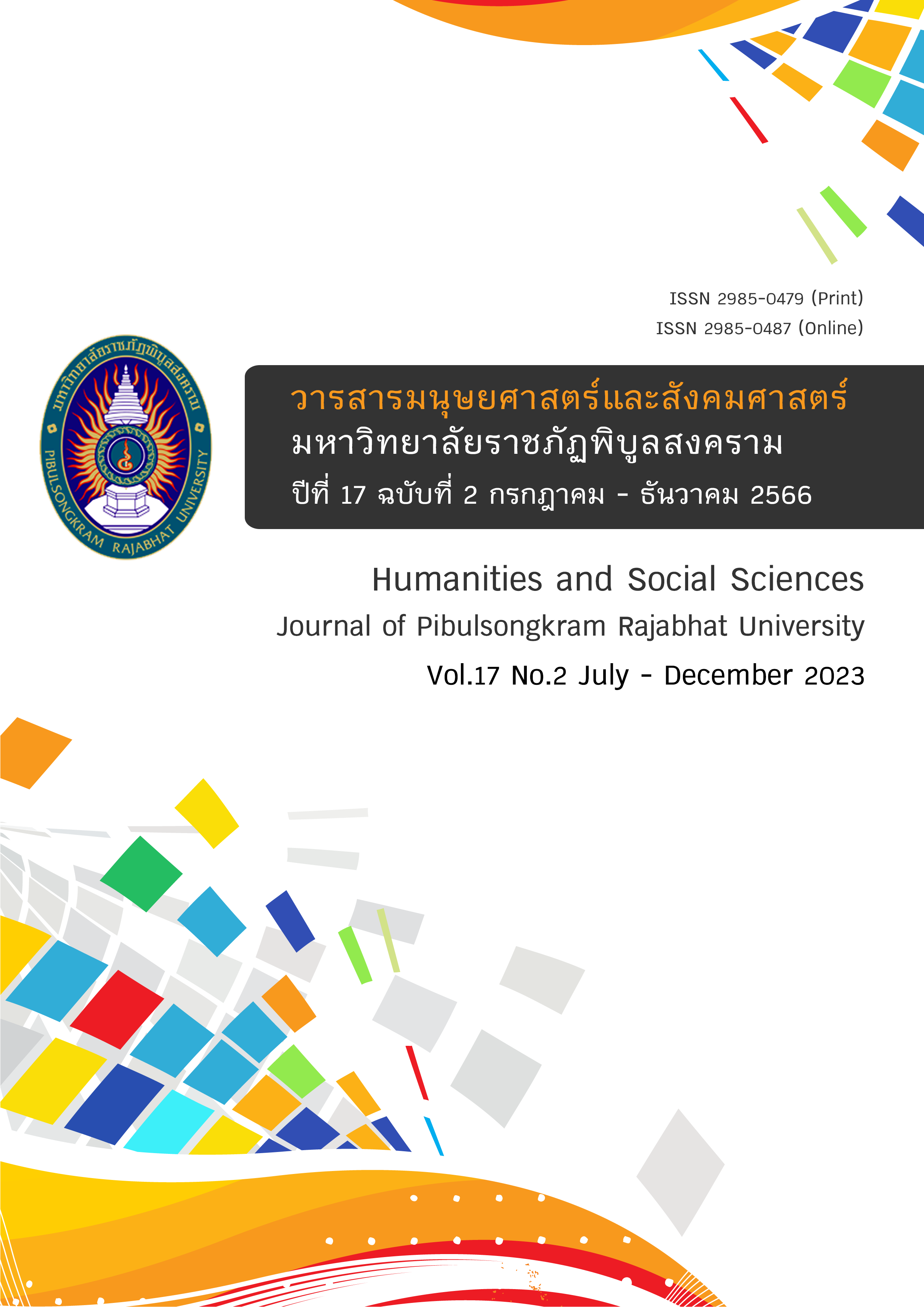A Confirmatory Factor Analysis of Digital Competence of Teachers in Eastern Economic Corridor Area under The Office of the Basic Education Commission
DOI:
https://doi.org/10.14456/psruhss.2023.37Keywords:
Digital competence, Confirmatory factor analysis, Eastern economic corridor areaAbstract
The research aimed 1) to study the level of digital competence of teachers in Eastern Economic Corridor area under the Office of the Basic Education Commission 2) to validate and confirm the model of digital competence of teachers in Eastern Economic Corridor area under the Office of the Basic Education Commission. The samples were 477 teachers in Eastern Economic Corridor area under the Office of the Basic Education Commission. The instrument of this research was digital competence for teacher questionnaire. The data were analyzed by using descriptive statistics and confirmatory factor analysis (CFA). The result of the research were
- The result of analysis level of digital competence of teachers at a high level (
= 3.850, S.D. = 0.518), The aspects that showed the highest means were the empowering learners (
= 4.195, S.D. = 0.640), followed by the digital resources (
= 4.030, S.D. = 0.747), assessment (
= 3.869, S.D. = 0.633), facilitating learner’s digital competence (
= 3.761, S.D. = 0.815), teaching and learning (
= 3.703, S.D. = 0.689), and professional engagement (
= 3.693, S.D. = 0.551).
- The result of second order of the confirmatory factor analysis (CFA) aligned with the empirical data by X2 = 136.873, X2/df = 0.889, df = 154, p = 0.836, RMSEA = 0.000, RMR = 0.032, GFI = 0.975, AGFI = 0.958 and CFI = 1.000. The correlation coefficient between 0.002 to 0.596. Factor loading of variables were between 0.858 to 0.966. The factor loading is sorted in descending order of the weight which are professional engagement, teaching and learning, facilitating learner’s digital competence, assessment, empowering learners and digital resources. According to this research, administrators and related agencies can utilize information to encourage and develop digital competence for teachers.
References
ขนิษฐา จิตแสง. (2563). การสื่อสารระหว่างบุคคลในบริบทการศึกษา. วารสารสารสนเทศศาสตร์, 39(3), 89-107.
ฐากร สิทธิโชค, และวิทวัส นิดสูงเนิน. (2564). ครูสังคมศึกษากับการจัดการเรียนรู้ในยุคดิจิทัล. วารสารศึกษาศาสตร์มหาวิทยาลัยทักษิณ, 21(1), 18-31.
ฐิติวัสส์ สุขป้อม, ณัฏฐกรณ์ ปะพาน, ปิยาภรณ์ เตชะเรืองรอง, และอุดม ตะหน่อง. (2563). ครูกับเทคโนโลยีการสอนในศตวรรษที่ 21. บัณฑิตวิทยาลัย มหาวิทยาลัยราชภัฏจันทรเกษม, 15(2), 1-17.
ประกาศคณะกรรมการคุรุสภา เรื่อง รายละเอียดของมาตรฐานความรู้และประสบการณ์วิชาชีพครู ตามข้อบังคับคุรุสภา ว่าด้วยมาตรฐานวิชาชีพ (ฉบับที่ 4) พ.ศ. 2562. (2563, 7 พฤษภาคม). ราชกิจจานุเบกษา. เล่ม 137 ตอนพิเศษ 109 ง. หน้า 10-14.
พิริยา ศิริวรรณ. (2559). การสื่อสารภายในองค์กร (คณะแพทยศาสตร์ ศิริราชพยาบาล) เรื่องที่ไม่อาจมองข้าม. วารสารเวชบันทึกศิริราช, 9(1), 38-43.
ศิริวรรณ วณิชวัฒนวรชัย. (2558). การจัดการเรียนรู้ที่เน้นความแตกต่างระหว่างบุคคล. วารสารศึกษาศาสตร์ มหาวิทยาลัยศิลปากร, 13(2), 65-75.
สำนักงานคณะกรรมการนโยบายเขตพัฒนาพิเศษภาคตะวันออก. (2561). แผนปฏิบัติการการพัฒนา บุคลากรการศึกษา การวิจัยและเทคโนโลยีรองรับการพัฒนาพิเศษภาคตะวันออก. สืบค้น 9 สิงหาคม 2564, จาก https://eeco.or.th/web-upload/filecenter/untitled%20folder/EEC013.pdf.
สำนักงานเลขาธิการสภาการศึกษา. (2560). แผนการศึกษาแห่งชาติ พ.ศ. 2560 - 2579. กรุงเทพฯ: พริกหวานกราฟฟิค.
สำนักงานเลขาธิการสภาการศึกษา. (2562). แนวปฏิบัติของการสร้างและส่งเสริมการรู้ดิจิทัลสำหรับครู. กรุงเทพฯ: พริกหวานกราฟฟิค.
สุกัญญา แช่มช้อย. (2562). การบริหารสถานศึกษาในยุคดิจิทัล = School Management in Digital Era. กรุงเทพฯ: จุฬาลงกรณ์มหาวิทยาลัย.
Alarcón, R., Jiménez-Pérez, E., & Vicente - Yagüe Jara, M. I. (2020). Development and validation of the DIGIGLO, a tool for assessing the digital competence of educators: A tool to assess digital competence of educators. British Journal of Educational Technology. 51(1), 1-15.
Best, W. J., & Kahn, J. V. (1993). Research in Education. Boston: Allyn and Bacon.
Dalby, D., & Swan, M. (2018). Using digital technology to enhance formative assessment in mathematics classrooms: Using digital technology in formative assessment. British Journal of Educational Technology, 50(2), 832-845.
Demeshkant, N., Potyrała, K., & Tomczyk, Ł. (2020). Levels of academic teachers digital competence : Polish case-study. Retrieved February 20, 2022, from https://www.researchgate.net/publication/346023046_Levels_of_academic_teachers_digital_competence_Polish_case-study.
Hair, J. F., Black, W. C., Babin, B. J., & Anderson, R. E. (2010). Multivariate date analysis. 7th ed. New Jersey: Pearson education.
Hatlevik, O. E., Guðmundsdóttir G. B., & Loi, M. (2015). Examining Factors Predicting Students' Digital Competence. Journal of Information Technology Education, 14(14), 123-137.
Krumsvik, R. (2011). Digital competence in Norwegian teacher education and schools. Högre utbildning, 1(1), 39-51.
Redecker, C., & Punie, Y. (2017). European Framework for the Digital Competence of Educators: DigCompEdu. Retrieved August 9, 2021, from https://publications.jrc.ec.europa.eu/repository/handle/JRC107466.
Strutynska, O., & Umryk, M. (2018). Analysis of development level of the certain digital competence of the Ukrainian educators. Retrieved August 10, 2021, fromhttp://weinoe.old.us.edu.pl/sites/weinoe.us.edu.pl/files/media/10-615.pdf.
Viberg, O., Mavroudi, A., Khlil, M., & Bälter, O. (2020). Validating an instrument to measure teacher’ preparedness to use digital technology in their teaching. Nordic Journal of digital literacy, 15(1), 39-55.
Downloads
Published
How to Cite
Issue
Section
License
Copyright (c) 2023 Humanities and Social Sciences Journal of Pibulsongkram Rajabhat University

This work is licensed under a Creative Commons Attribution-NonCommercial-NoDerivatives 4.0 International License.
Any articles or comments appearing in the Journal of Humanities and Social Sciences, Rajabhat Phibulsongkram University, are the intellectual property of the authors, and do not necessarily reflect the views of the editorial board. Published articles are copyrighted by the Journal of Humanities and Social Sciences, Rajabhat Phibulsongkram University.









